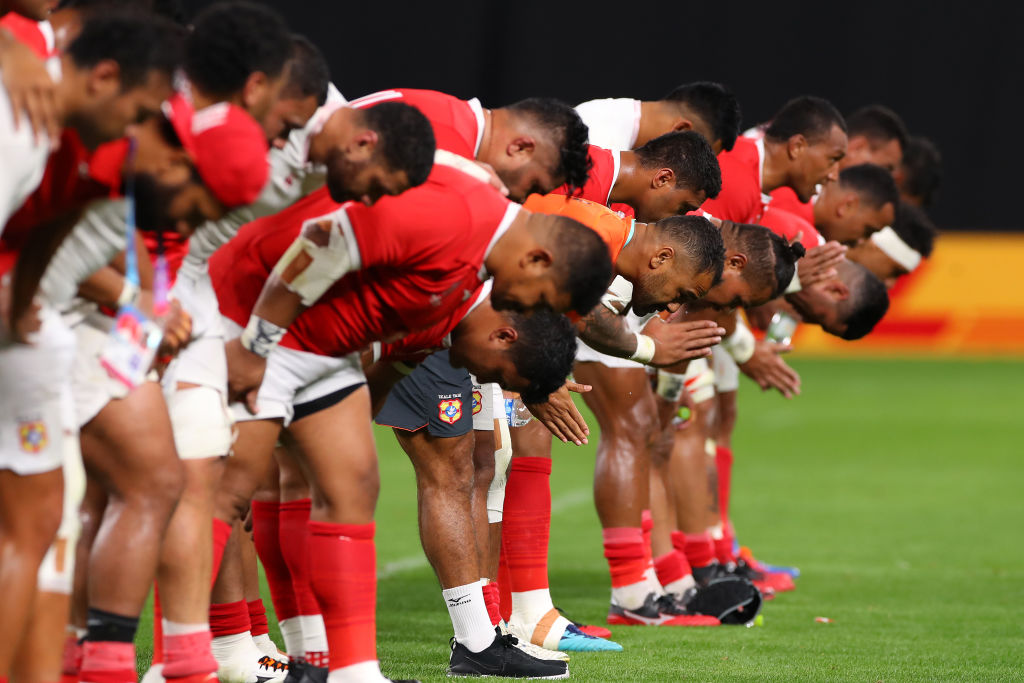Gallagher column: Tonga and Samoa should have a base in Auckland

SAPPORO, JAPAN - SEPTEMBER 22: Tonga players bow to applaud fans after the Rugby World Cup 2019 Group C game between England and Tonga at Sapporo Dome on September 22, 2019 in Sapporo, Hokkaido, Japan. (Photo by Mark Kolbe/Getty Images)
Tonga briefly entered our rugby consciousness last Sunday morning but we won’t be giving them another thought so this is probably an opportune time to briefly consider what constitutes the Tongan rugby team these days.
My guess is that you have scarcely given them a second thought since Nili Latu and his brave men gave England plenty to think about at RWC2007. Indeed England have never played them in a capped Test outside of the World Cup.
The reality of 2019 might shock you a little but, in a nutshell, sums up the dilemma of trying to fashion a long-term future for the game in much of the Pacific.
The bottom line is rugby on the islands of Tonga – which collectively have a population of just 108,000 – is contracting alarmingly with just the Datec Provincial championship offering any rugby of quality. Their national side has become massively reliant on their diaspora, there is very little to build on and invest in at home which has been a genuine problem for World Rugby.
By my reckoning 18 of the Tongan squad of 31 were born in New Zealand of Tongan parents – not grandparents – and another two were born in Australia of Tongan parents. In addition five of the squad were born in Tonga before moving with their families to New Zealand in their early teens.
Tonga are a team in exile even though the connection with the motherland is 24/7. The guys speak Tongan, as well as English – well New Zealand English! – they are raised in proud Tongan households, they return frequently to Tonga and send money back home to their extended Tongan families.
But this situation sets up a tricky dynamic. They are also New Zealanders. Ten of the squad have appeared at various times in New Zealand U20 squads which at first sounds quite a healthy affair but in practice means that New Zealand simply cast their net very wide on a talent trawl before discarding those they aren’t interested in.
Similarly Steve Mafi – the grandson of Sione Mafi who captained Tonga to a famous win over Australia in Brisbane in 1973 – played for Australia Schools and Australia U20 before he finally returned to the Tongan fold. Wing Cooper Vuna actually played two full Tests for Australia before using the Olympic Sevens loophole to work his way back to the land of his mother and father.
It’s a similar situation with Samoa who have an equally strong relationship with New Zealand and Australia. With Manu Samoa, 14 of their squad were born in New Zealand of Samoan parents with three of them appearing for either New Zealand U20 or New Zealand Sevens.
Two others – Seilala Lam and Paul Alo Emile – also played for Australia U20 after their families moved across the Tasman sea. Another three of the Samoan squad were born in Australia of Samoan parents and played for Australia U20 before they, too, dropped out of the system and turned to their Samoa roots.
The one Pacific Island to buck this trend is Fiji although their top players are still ruthlessly scouted by Australia, New Zealand, France and even England if you include Nathan Hughes. All but four of the Fijian squad were born and raised in Fiji and played their schoolboy and youth rugby in Fiji before using their skills as a passport to travel the world and earn a living.
Fiji, somehow, has remained a hotbed of indigenous home grown rugby talent while the other two nations – through no fault of their own – have been forced to rely on their diaspora and, to borrow from the world or horse-racing, their bloodline.
World Rugby needs to absorb both scenarios and make some radical decisions after this World Cup because they have been tiptoeing around this issue for decades.
Fiji is manifestly a rugby nation that would profit from massive structural investment at home, the one Pacific Islands side that could in due course sustain a Super Rugby team and perhaps join an enlarged Rugby Championship.
Fiji could become a proper T1 rugby nation if the will existed. Much stranger things have happened. It’s not that long ago that Dave Brailsford was scoffed at when he promised he would deliver a British tour de France winner inside five years.
With Tonga and Samoa the reality needs to be acknowledged and a different, grown up, 21st century solution found. World Rugby must think outside of the box and indeed outside of the countries themselves. The two national teams surely now need to be formally based in Auckland, that is where their player base initially resides, that is where they can build from…but only if they are free from predatory influences.
For a while now Argentina have fielded strongish development sides in domestic South African tournaments like the Vodacom Cup and Currie Cup but that depends totally on the generosity of the South African rugby community and an undertaking not to poach and entice.
The Boks deserve huge credit on this. Tonga and Samoa should do likewise in New Zealand. It would feel odd and take some getting used too but the alternative is to see these sides gradually disappear. And surely nobody wants that.